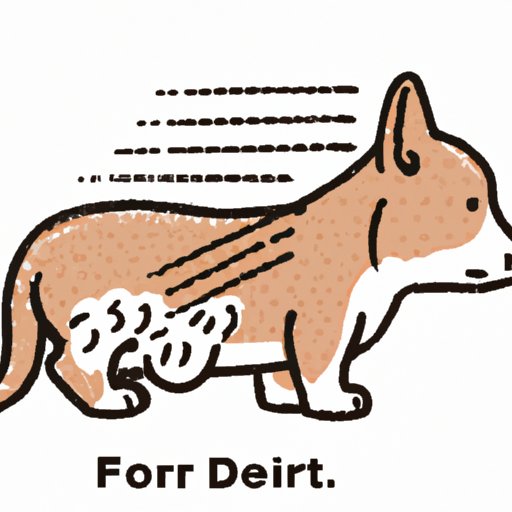Why is My Dog So Gassy and What Can I Do About It?
Do you ever find yourself crinkling up your nose at your furry friend’s passing gas? While it may seem like an annoying, albeit harmless, issue, excessive gas can actually indicate more serious health problems. In this article, we will explore the science behind your dog’s flatulence, common causes, and natural remedies that can help. Additionally, we will break down your dog’s diet and explore the impact it has on flatulence, provide a checklist of behaviors to monitor, and discuss when it’s important to seek veterinary attention. Keep reading to understand why is my dog so gassy and what you can do about it.
The Science Behind Your Dog’s Gas: Understanding the Causes and Remedies
As with humans, a dog’s digestive system is responsible for breaking down food into nutrients and extracting them for energy. However, the digestive process can also lead to gas production. Many factors can contribute to this, including swallowing air, bacterial imbalances, and food intolerances. To treat flatulence correctly, it’s vital to identify and address the root cause. For example, incorporating probiotics into your dog’s diet can help balance intestinal flora and reduce gas production.
Help! Why is My Dog So Gassy and What Can I Do About It?
If you’ve noticed an increase in flatulence, you may be wondering if there’s anything to worry about. While passing gas occasionally is common, persistent bloating and gas production can be an indicator of larger health problems. As a pet owner, it’s essential to monitor your dog’s diet, eating behaviors, and bodily functions. If symptoms are severe or prolonged, it may be time to seek veterinary attention. Still, there are many things you can do at home to help reduce gas and alleviate discomfort for your furry friend. Some of these techniques include changing their diet, using over-the-counter products, or adjusting their meal frequency, portion size, and hydration levels.
Breaking Down Your Dog’s Diet: The Impact on Flatulence
As with many health issues, your dog’s diet plays a huge role in flatulence. Certain types of food and feeding behaviors can lead to increased gas production. For example, large meals or eating rapidly can cause your dog to ingest excess air. Some ingredients, including lactose, grains, and high-fat foods, can be more difficult for dogs to digest and contribute to bloating. Alternatively, providing small, frequent meals can help regulate digestion and reduce gas production. It’s essential to monitor what your dog is eating, how often they are eating, and how much they are eating to identify dietary factors that may be contributing to flatulence.
Natural Ways to Reduce Your Dog’s Gas: A Guide for Pet Owners
If your dog is struggling with gas, various natural remedies may help. For example, incorporating probiotics, coconut oil, or ginger into your dog’s diet can help balance flora levels, support digestion, and reduce inflammation. Additionally, certain products, such as gas-reducing treats, can help alleviate discomfort. However, it’s essential to speak with your vet before making any significant changes to your pet’s diet or lifestyle. They can advise on the best natural approaches and help you create a plan that works best for your dog’s unique needs.
When Gas is More than a Smelly Problem: Addressing Health Concerns
While most cases of flatulence are relatively benign, certain symptoms should not be ignored. For example, persistent bloating, a loss of appetite, vomiting, or diarrhea can indicate that your dog is struggling with more severe health issues, such as gastroenteritis or an intestinal obstruction. As a general rule, it’s essential to bring any significant changes in behavior to your vet’s attention. They can help diagnose and treat underlying problems, reducing the risks of more severe health deterioration down the road.
The Top Ten Foods to Avoid Feeding Your Dog to Prevent Flatulence
It’s important to note that some foods are more likely to cause gastrointestinal upset than others. As a general rule, it’s best to stick with a well-balanced, nutrient-rich diet specifically designed for dogs. Avoid feeding your furry friend foods that are toxic or high in fat, lactose, or grains. These foods are hard to digest and can contribute to gas, bloating, and discomfort. Examples include chocolate, onions, garlic, avocado, dairy, and processed meats. Instead, opt for lean proteins, fruits and vegetables, and healthy whole grains to provide optimal nutrients and support digestion without adding to flatulence.
Conclusion
While flatulence may seem like a minor annoyance, it can be an indicator of more serious health problems. Understanding the science behind your dog’s gas production, monitoring their behavior and diet, and natural remedies can help alleviate discomfort and address the root cause of the problem. It’s essential to work with your vet to develop a personalized plan that caters to your dog’s unique dietary and lifestyle requirements. With the right approach, most cases of flatulence can be resolved, allowing your furry friend to enjoy optimal health and quality of life.
